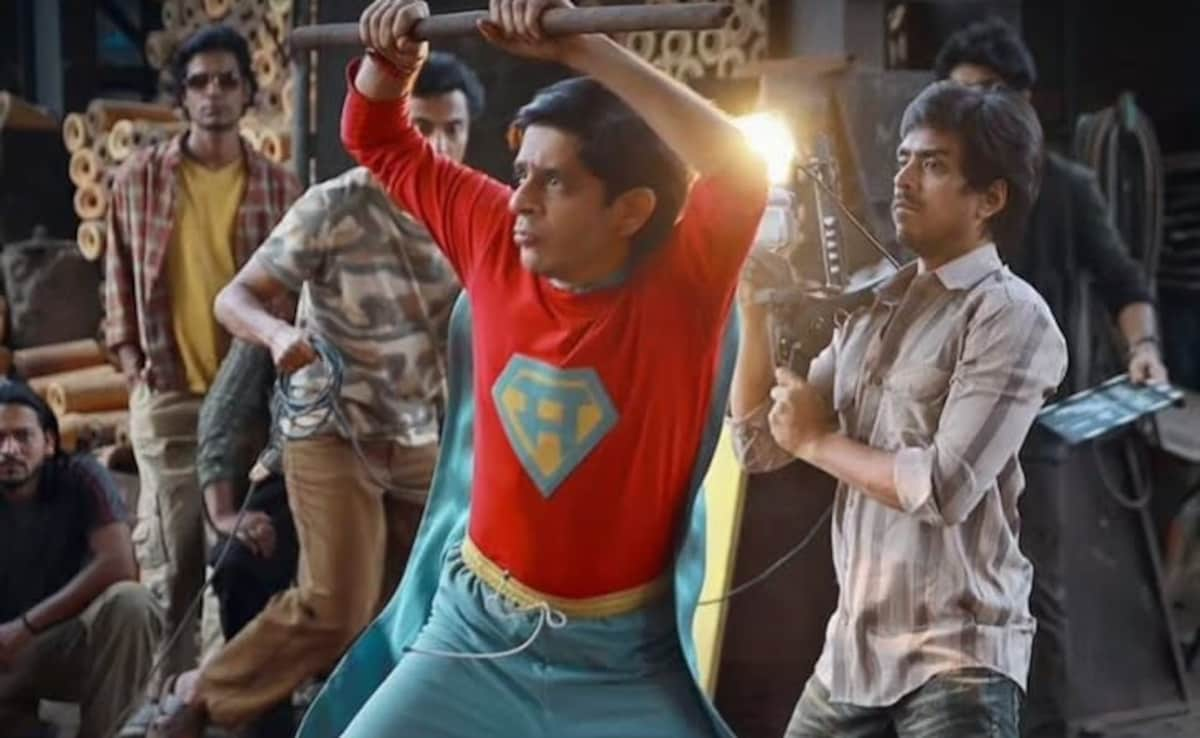“Superboys of Malegaon,” directed by Reema Kagti, narrates the inspiring true story of an unconventional group of filmmakers from Malegaon, who strive to create movies against societal and economic challenges. The film, a fictionalized account based on Faiza Ahmad Khan’s documentary, explores the lives of characters like Nasir, who, frustrated by mainstream cinema, ventures into filmmaking with meager resources. It effectively portrays their ambitions, friendships, and struggles within a conservative society, all while celebrating the essence of filmmaking. With engaging performances and adept direction, “Superboys of Malegaon” presents a heartfelt tribute to creativity and determination in the face of adversity.
New Delhi:
The remarkable true story surrounding the filmmakers of Malegaon has captivated the public for over fifteen years, consistently intriguing audiences. This narrative embodies the clash between the improbable dreams of ordinary individuals and the formidable societal and economic challenges they face, resulting in astonishing displays of self-belief.
Director Reema Kagti presents this journey in Superboys of Malegaon, a straightforward fictionalized portrayal. Her film is a thrilling rollercoaster, seamlessly transitioning between dizzying highs and sobering moments, playful and contemplative.
Superboys of Malegaon, produced by Excel Entertainment and Tiger Baby, tells the tale of unremarkable lives transformed by extraordinary journeys. The film remains firmly rooted in reality and relatability, expertly avoiding the clichés typical of the genre.
It refrains from portraying the men of Malegaon as eccentric characters in a clichéd rags-to-riches narrative. Instead, it depicts them as they truly are—real individuals navigating the tumultuous landscape of ambition, friendship, and the fleeting nature of love amidst the unavoidable impermanence of fame and success.
Above all, it celebrates the chaos of filmmaking and explores the dynamics of an economically liberalized society wrestling with conflicting desires. The setting and characters are inspired by Faiza Ahmad Khan’s documentary Supermen of Malegaon, created in 2008 and released in 2012, but it ventures beyond the borders of non-fiction.
Amid the barrage of loud, hyper-nationalistic blockbusters Bollywood currently churns out, Superboys of Malegaon offers a refreshing respite—a return to a cinematic experience where authentic humanity confronts its shortcomings and seeks pathways to transcend them.
The screenplay, penned by Varun Grover (who also collaborated with Shoaib Zulfi Nazeer for the dialogues), carries a sharp understanding of how the magic of ordinary life intersects with the yearning to escape the daily grind of survival.
The film provides a breezy narrative about the chaotic yet determined filmmaking endeavors in the town, which, like all art, serve as a bastion against apathy, obscurity, and mortality.
It’s important to note that, especially for the Malegaon crew (including a girl with a baby who agrees to portray a version of Sholay’s Basanti in a rough adaptation of the iconic film), far more mundane issues are at play—economic instability, vocational barriers, and the deep-rooted patriarchy in a highly conservative society where women are often discouraged from stepping beyond their domestic roles.
Can a film made today, intended for streaming after a theatrical run, truly capture the fits and starts of the lives and films crafted by Nasir Shaikh (Adarsh Gourav), his best friend and power loom factory worker Shafique Shaikh (Shashank Arora), alcoholic writer Farogh (Vineet Kumar Singh), and the eclectic Malegaon ensemble?
Superboys of Malegaon comes remarkably close to portraying the spontaneous rhythms of life in a place where the ordinary is more ordinary than in many other locales, yet still laden with unsettling uncertainties. It benefits from Swapnil S. Sonawane’s unobtrusive yet stellar cinematography and Anand Subaya’s editing, which offers the film a much-needed syncopated rhythm.
The film contains all the characteristics one would expect from a story about men and a woman from a conservative background striving to escape obscurity with minimal resources but abundant courage.
Driven by thoughtful performances that combine energy with restraint, the characters and their narrative reach for greatness while staying grounded. It begins in 1997 at a video parlor, where Nasir shows films featuring Charlie Chaplin and Buster Keaton. Unfortunately, the audience does not show up, opting instead for current Bollywood films playing at a nearby theater.
To attract viewers, Nasir spices up his screenings by blending Chaplin and Keaton with Bruce Lee and Jackie Chan, offering an unparalleled movie experience. The tactic works until the police intervene, accusing Nasir of piracy and shutting down the video parlor.
Cornered and with no other options, Nasir, equipped with just Rs 12,000, embarks on creating his own films—parodies of Bollywood hits—tailored for the local audience in their native tongue.
There’s skepticism all around, particularly from Nasir’s older brother Nihal (Gyanendra Tripathi), who doubts that filmmaking can provide for their daily bread. Meanwhile, his friends—a tea vendor, a dry fruits merchant, a wedding videographer, an Urdu teacher, and various power loom workers—rally around him, marking the start of their venture with Malegaon Ke Sholay. Challenges abound for Nasir.
Romantic matters also weigh heavily on him. The girl he loves, Mallika (Riddhi Kumar), is out of his reach. However, Shabeena (Muskaan Jaferi), who is studying to become a lawyer, harbors feelings for him. The only other woman associated with Superboys of Malegaon, Trupti (Manjiri Pupala), is an actress seeking to escape an abusive marriage and developing a delicate bond with Shafique.
The idea of moving to Mumbai never crosses Nasir’s mind. Fully aware of the fierce competition in Bollywood, he hesitates to leave the comfort of his home. Conversely, writer Farogh, weary of the imitations produced by Nasir, relocates to Mumbai in pursuit of better opportunities.
The writer is the boss, Farogh exclaims, realizing to his dismay that Nasir has little interest in pursuing original ideas.
In Superboys of Malegaon, the writer indeed holds the power, but the film, led by director Kagti and its main cast Adarsh Gourav, Shashank Arora, Vineet Kumar Singh, and Muskaan Jaferi, is a comprehensive delight—a spirited, heartwarming, and quietly super tribute to cinema.
